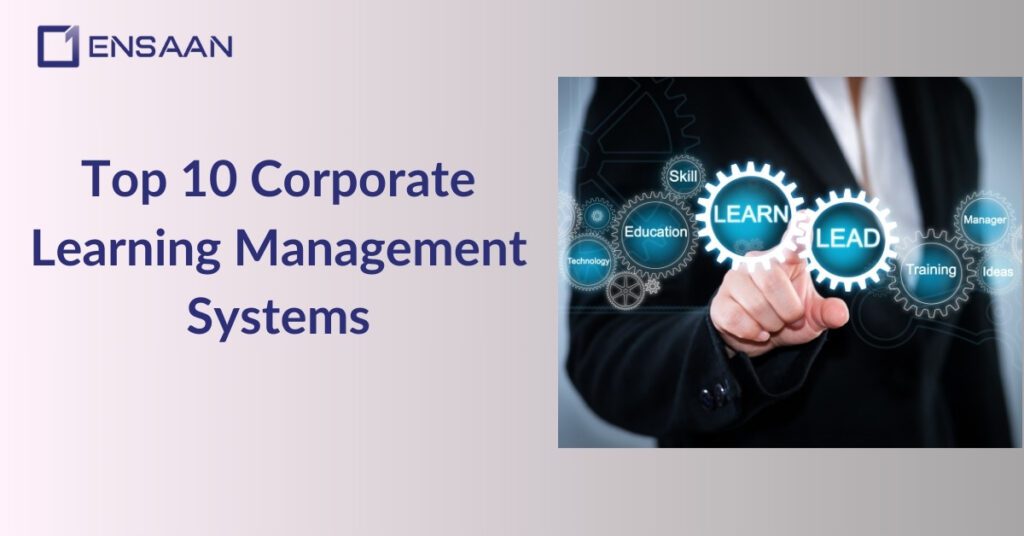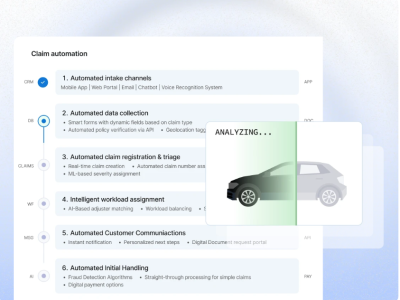In today’s fast-moving business world, things change quickly new technology, new rules, and new skills keep coming up.
Companies need to provide ongoing employee training. But old methods, like classroom sessions or printed handbooks, tend to be slow and ineffective.
That is where Corporate Learning Management Systems (LMS) come into play. A corporate LMS is an online tool that helps companies organize, share and track training for their staff members.
Welcome new employees, teach new skills, enforce rules and more – this tool can do it all!
Choosing an LMS that best serves your team’s learning, development and success can be crucial – however with so many choices out there it can be confusing and overwhelming.
That’s why we’ve made this simple guide showing the top 10 LMS platforms for companies in 2025.
Starting with two of our most popular Software – Cornerstone OnDemand and Saba Cloud.
we will explore their individual features and purposes, starting with an explanation for why each might be ideal for you.
Table of contents

Top 10 Corporate Learning Management Systems
1. Cornerstone OnDemand
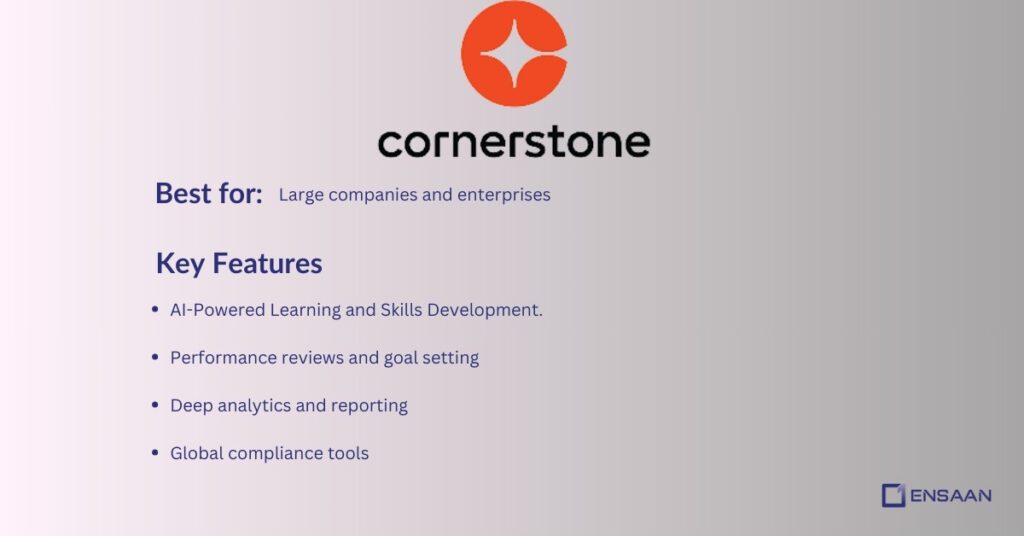
Cornerstone is a top corporate learning management system (LMS), and there are good reasons for this.
What makes Cornerstone special is that it’s a complete, cloud-based system that handles everything from employee training to performance management.
Whether you have a medium or large company, Cornerstone can grow with you and adapt to your needs.
Key Features:
-
- Personalized Learning Paths: Create custom training journeys for employees based on their role, skills, and goals.
-
- Compliance Training: Automatically assign and track mandatory training like safety or policy updates.
-
- Analytics & Reporting: Get clear insights into who’s learning what and how well they’re doing.
-
- Content Anytime Library: Access thousands of ready-to-use courses.
Best For:
Mid to large-sized companies looking for a powerful, all-in-one talent development platform.
Why We Like It:
Cornerstone isn’t just an LMS it’s part of a full talent suite, including performance reviews, goal tracking, and succession planning.
2. Saba Cloud
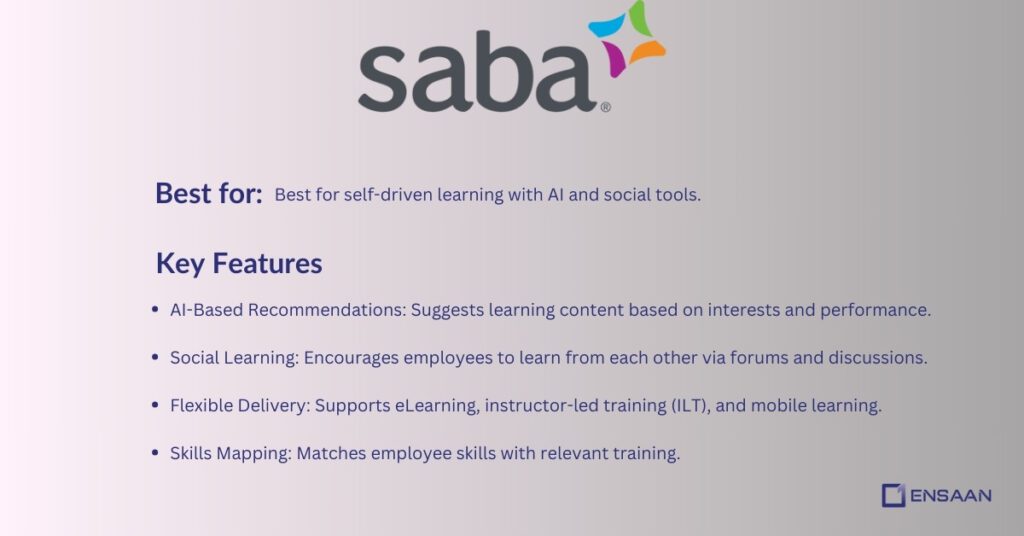
Saba was once a separate LMS platform but is now part of the Cornerstone family. Still, many companies continue to use the Saba Cloud version due to its specific strengths in learning experience personalization.
Key Features:
-
- AI-Based Recommendations: Suggests learning content based on interests and performance.
-
- Social Learning: Encourages employees to learn from each other via forums and discussions.
-
- Flexible Delivery: Supports eLearning, instructor-led training (ILT), and mobile learning.
-
- Skills Mapping: Matches employee skills with relevant training.
Best For:
Companies that want to encourage a culture of self-driven learning with AI and social tools.
Why We Like It:
Saba makes learning feel less like “training” and more like professional development. It focuses heavily on the learner’s experience.
3. Docebo
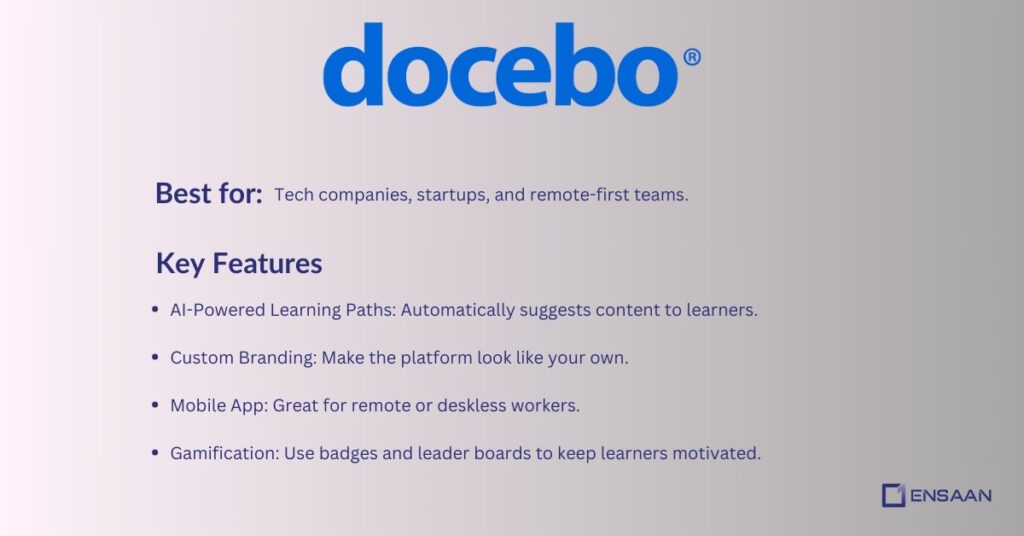
Docebo is a favorite among modern, fast-growing businesses. It’s known for its clean interface, AI features, and easy integration with tools like Zoom, Salesforce, and Microsoft Teams.
Key Features:
-
- AI-Powered Learning Paths: Automatically suggests content to learners.
-
- Custom Branding: Make the platform look like your own.
-
- Mobile App: Great for remote or deskless workers.
-
- Gamification: Use badges and leaderboards to keep learners motivated.
Best For:
Tech companies, startups, and remote-first teams.
Why We Like It:
Docebo is super intuitive and makes learning feel natural, not forced. Plus, it plays well with your existing tools.
4. SAP Litmos
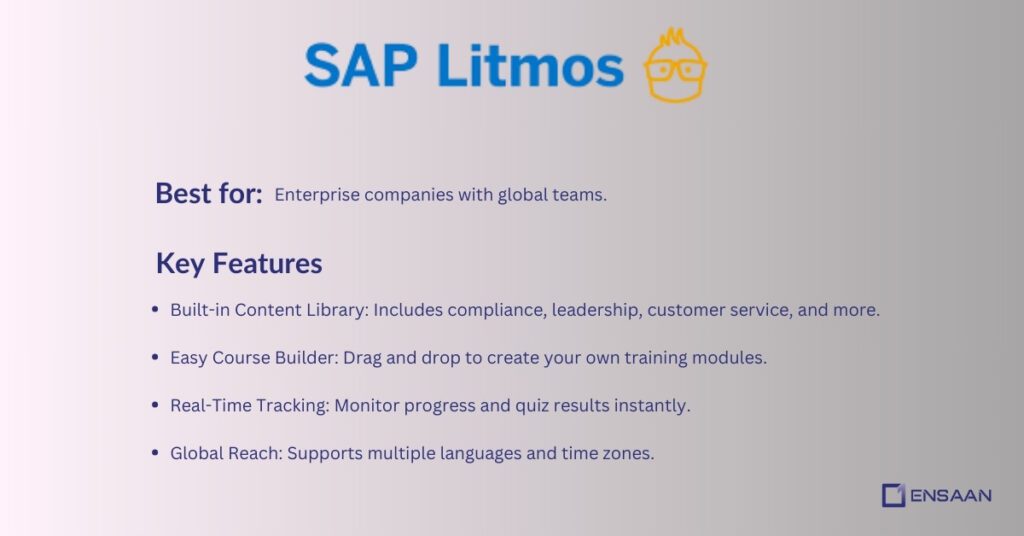
SAP Litmos is popular among large organizations looking for fast deployment and global scale. It offers both a learning management system and a library of off-the-shelf courses.
Key Features:
-
- Built-in Content Library: Includes compliance, leadership, customer service, and more.
-
- Easy Course Builder: Drag and drop to create your own training modules.
-
- Real-Time Tracking: Monitor progress and quiz results instantly.
-
- Global Reach: Supports multiple languages and time zones.
Best For:
Enterprise companies with global teams.
Why We Like It:
SAP Litmos is quick to roll out and has excellent compliance features—perfect for industries like finance, healthcare, and retail.
5. TalentLMS
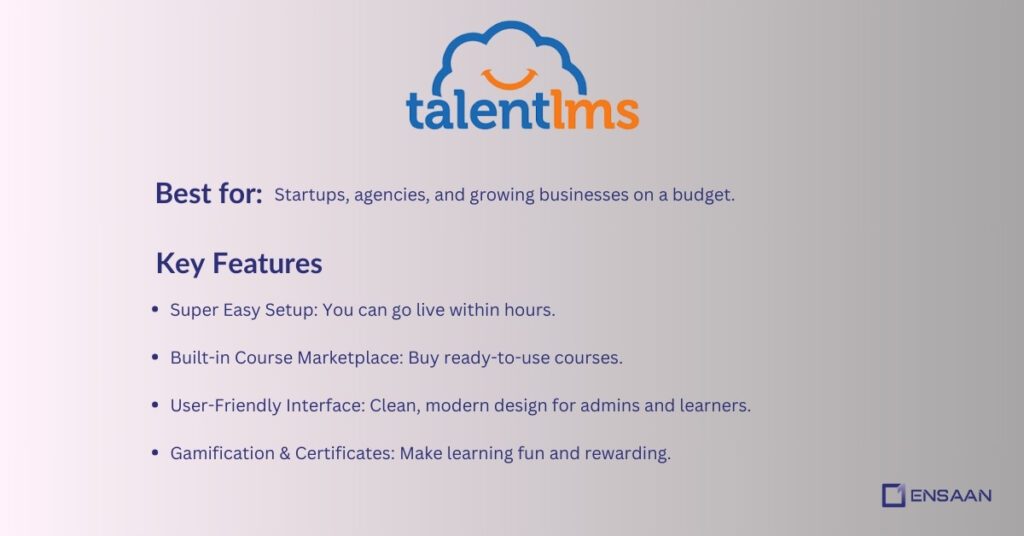
If you’re a medium or large- sized business and just getting started with eLearning, TalentLMS is a great place to begin.
Key Features:
-
- Super Easy Setup: You can go live within hours.
-
- Built-in Course Marketplace: Buy ready-to-use courses.
-
- User-Friendly Interface: Clean, modern design for admins and learners.
-
- Gamification & Certificates: Make learning fun and rewarding.
Best For:
Startups, agencies, and growing businesses on a budget.
Why We Like It:
TalentLMS is affordable and flexible. It offers a free tier, which is great for medium or large- sized business.
6. LearnUpon
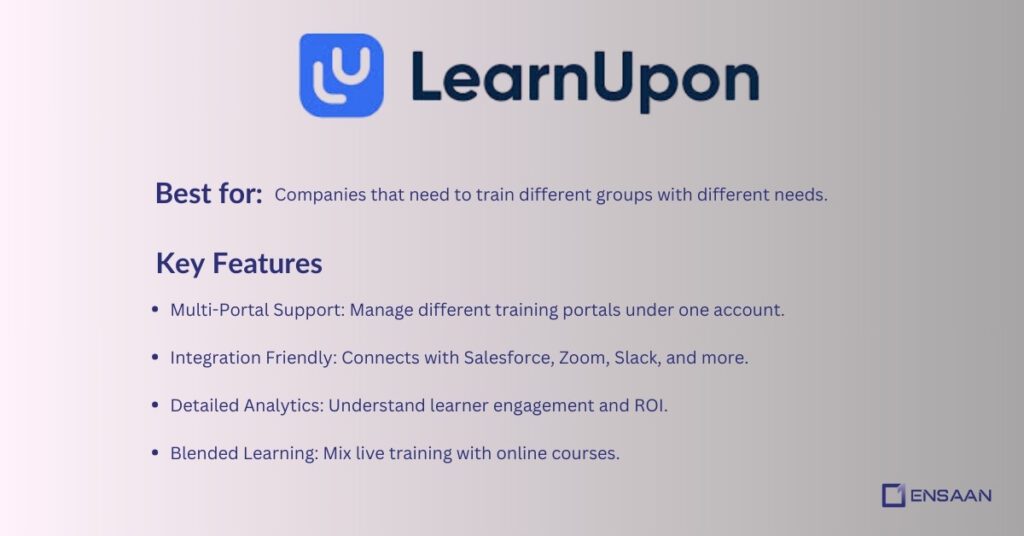
LearnUpon is designed to help businesses train multiple audiences employees, partners, and even customers from one platform.
Key Features:
-
- Multi-Portal Support: Manage different training portals under one account.
-
- Integration Friendly: Connects with Salesforce, Zoom, Slack, and more.
-
- Detailed Analytics: Understand learner engagement and ROI.
-
- Blended Learning: Mix live training with online courses.
Best For:
Companies that need to train different groups with different needs.
Why We Like It:
LearnUpon is super versatile. Whether you’re training staff or onboarding new clients, it can handle it all.
7. Moodle Workplace
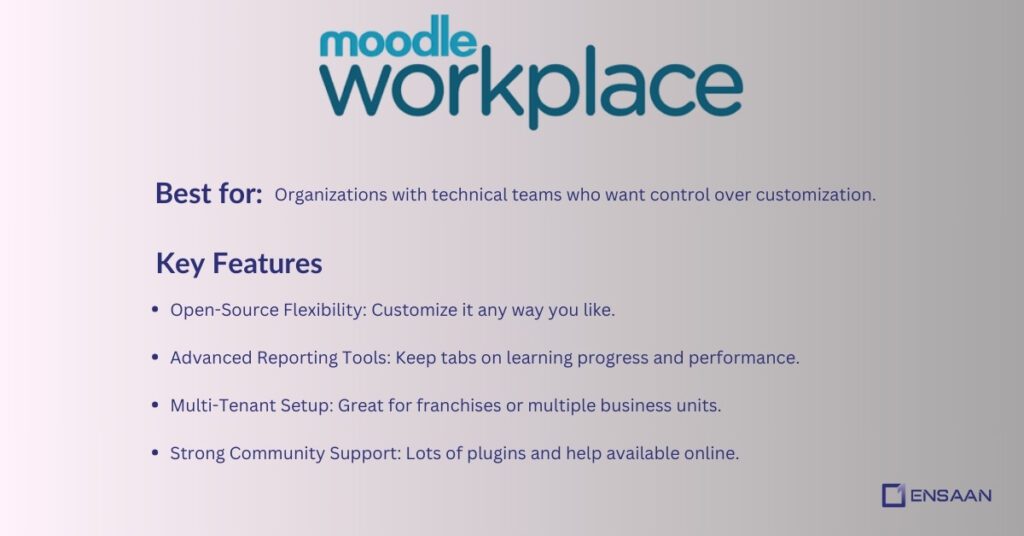
You might have heard of Moodle in education, but Moodle Workplace is built specifically for corporate training.
Key Features:
-
- Open-Source Flexibility: Customize it any way you like.
-
- Advanced Reporting Tools: Keep tabs on learning progress and performance.
-
- Multi-Tenant Setup: Great for franchises or multiple business units.
-
- Strong Community Support: Lots of plugins and help available online.
Best For:
Organizations with technical teams who want control over customization.
Why We Like It:
Moodle gives you freedom it’s open source, so you’re not locked into vendor pricing or features.
8. Absorb LMS
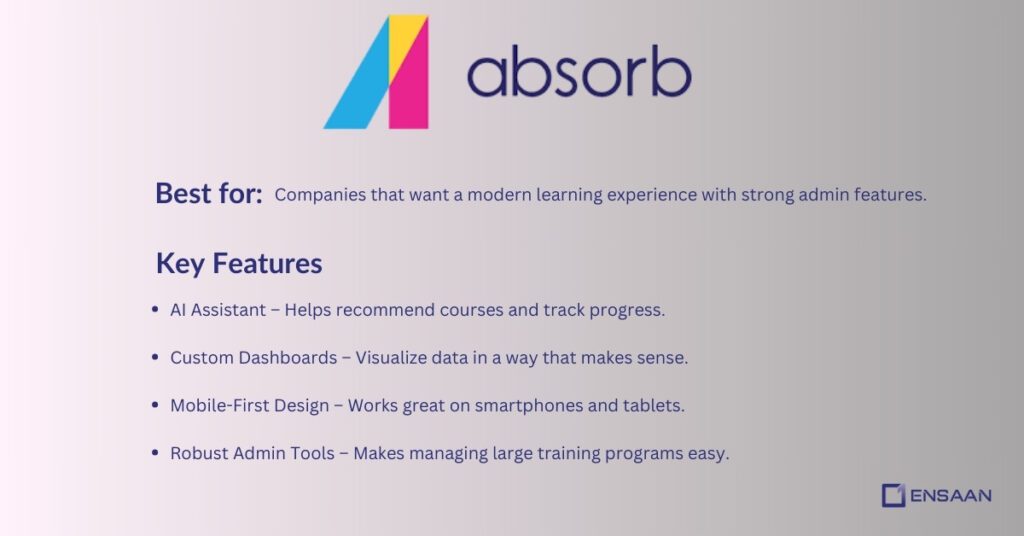
Absorb is sleek, modern, and powerful. It’s designed for both internal training and external learning (like customer education or partner training).
Key Features:
-
- AI Assistant – Helps recommend courses and track progress.
-
- Custom Dashboards – Visualize data in a way that makes sense.
-
- Mobile-First Design – Works great on smartphones and tablets.
-
- Robust Admin Tools – Makes managing large training programs easy.
Best For:
Companies that want a modern learning experience with strong admin features.
Why We Like It:
Absorb looks good and performs even better. It’s also one of the few LMSs built with marketing teams in mind.
9. iSpring Learn
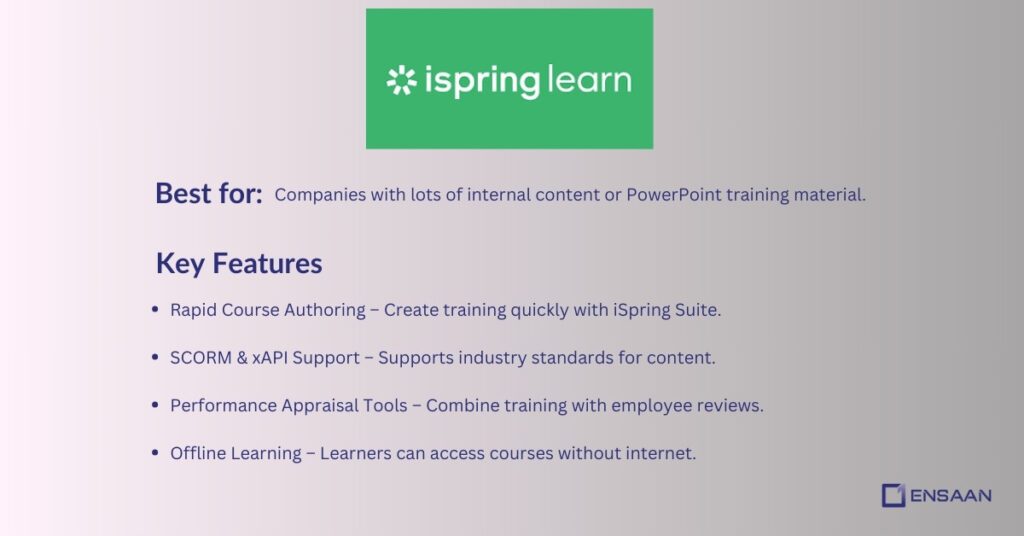
iSpring is known for its PowerPoint-based content creation, making it a great choice for companies already using Microsoft Office.
Key Features:
-
- Rapid Course Authoring: Create training quickly with iSpring Suite.
-
- SCORM & xAPI Support: Supports industry standards for content.
-
- Performance Appraisal Tools: Combine training with employee reviews.
-
- Offline Learning: Learners can access courses without internet.
Best For:
Companies with lots of internal content or PowerPoint training material.
Why We Like It:
iSpring makes content creation super simple especially if your team already knows PowerPoint.
10. 360Learning

360Learning is a newer player that focuses on collaborative learning where employees not only learn but also contribute to the learning content.
Key Features:
-
- Collaborative Authoring – Let your team build training together.
-
- Project-Based Learning – Turn real work projects into learning experiences.
-
- Feedback Tools – Let learners comment and improve courses.
-
- Mobile Learning – Designed for learning on the go.
Best For:
Modern teams who want a bottom-up approach to training.
Why We Like It:
360Learning puts people first. It’s not just about assigning courses—it’s about sharing knowledge as a team.

Conclusion
In 2025, learning is no longer a “nice-to-have” it’s a strategic priority. The right Learning Management System (LMS) can transform how your organization trains, develops, and retains talent.
Whether you’re a startup looking for a budget-friendly platform or an enterprise needing a scalable, AI-powered solution, there’s an LMS tailored to your needs.
Each of the platforms listed here brings something unique to the table from advanced analytics and automation to social learning and compliance tracking.
By choosing the LMS that fits your company’s size, goals, and learning culture, you’re investing in your people and ultimately, in your company’s future.
So, take the next step. Explore your options, request demos, and pick the LMS that helps your team learn, grow, and succeed.
FAQ
1. What is a Learning Management System (LMS)?
An LMS is a tool that helps companies create, share, and manage training for their employees online. It makes learning easier, faster, and more organized.
2. Why do companies use an LMS?
Companies use an LMS to train new staff, teach new skills, follow rules (compliance), and help employees grow.
3. Can medium or large- sized business use an LMS?
Yes! Many LMS platforms, like Cornerstone or Saba, are great for medium or large- sized business. They are easy to use and cost less than big enterprise systems.
4. How much does an LMS cost?
The cost depends on the platform and your needs. Some LMS tools offer free plans or low-cost options, while others charge based on the number of users or features.
5. Is it hard to set up an LMS?
Most modern LMS platforms are user-friendly and offer help during setup. Some even come with ready-made courses and templates to get started quickly.

